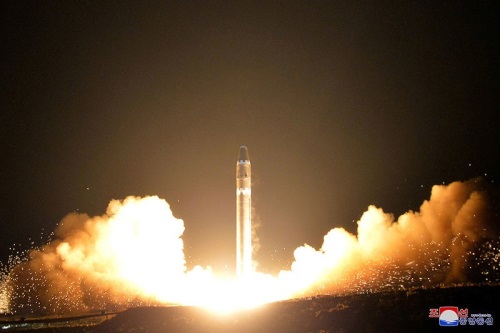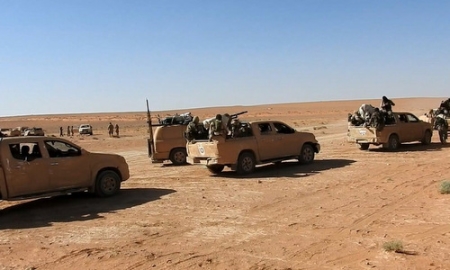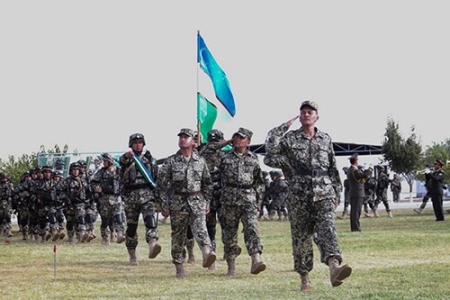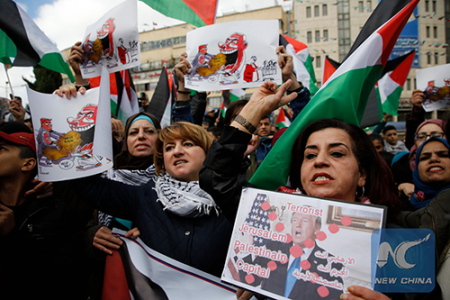Generally, the trend of peace, cooperation and development dominated 2017. However, a lot of events did and are going to happen, making tremendous effects on different states, regions and the world at different levels. Basing on our studies, National Defence Journal has taken out “Top 10 defence and military events over the world in 2017”.
1. Growing tensions over Korean Peninsula
In 2017, Democratic People’s Republic of Korea (DPRK – North Korea) conducted six nuclear tests and launched many missiles. Most recently, on 29th November, North Korea fired a multiple independently targetable reentry vehicle (MIRV), called Hwasong-15, which was capable to hit the U.S. mainland with the range of over 13,000 km. After the test, on the 12th December, Deputy President of Workers’ Party of Korea, Thea Jong-su announced that North Korea had joined the club of major nuclear and missile powers of the world, which presented greater threats to regional and global security. In that context, the U.S. speeded the Terminal High Altitude Area Defense (THAAD) installation in the Republic of Korea (ROK – South Korea). This move further complicated the situation in Korean Peninsula and undermined the region’s strategic balance, while concerning China and Russia. Moreover, the U.S., ROK and Japan conducted a number of large joint exercises, even in the middle of tensions. North Korea voiced their vehement opposition, saying those had been provocations. Meanwhile, in preventing North Korea’s missile and nuclear programs, the UN has imposed many severe sanctions against Pyongyang for its violations of the organization’s resolutions.
 |
| Hwasong-15 missile launched on November 29th, 2017 (photo: KCNA) |
2. The defeats of Islamic State (IS) in Syria and Iraq
The self-proclaimed Islamic State (IS) had taken control over the major part of Syrian territory and a smaller Iraqi one at the border with Syria and declared the establishment of a transborder “empire”. Since then, this terrorist organization had spearheaded a lot of barbarous attacks against civilian communities. Fortunately, Syrian Army, supported by Russian Air Force, has prevailed the IS forces over Syria’s territory. On 8th November, Syrian Army freed Abu Kamal, the largest stronghold of the terrorists. On 11th December, President V. Putin announced that Russian Armed Forces had accomplished their missions and would be partly withdrawn to their homeland.
In Iraq, with the assistance of the U.S-led alliance, Iraqi Armed Forces had gradually gained back its control over the territories which IS had conquered since 2014. On 26th October, Iraqi Armed Forces won the battle against the last IS fighters in Euphrates valley. On the 9th December, Iraq announced that its entire country had been freed from IS terrorists.
 |
| IS remnants retreat from Syria (photo: Southfront) |
3. Increasing number of military exercises over the world
From the 4th to the 8th December, the U.S. – ROK largest-ever exercise was conducted amid serious tensions on Korean Peninsula. A large number of weapons and personnel were mobilized in the exercise, including U2s, F-22s, F-35s, etc. and 12,000 troops. In a bid to improve their defence capabilities, in September, Russia and Belarus kicked off a joint drill – Zapad-2017 – against an assumed invasion from the West. The war-games, which saw 138 tanks, 231 armored vehicles, 241 tactical missile and artillery systems, 40 warplanes and around 12,700 Russian troops – 10,200 of them were sent to Belarus, provoked different responses from NATO member states, especially those at Baltic region. Meanwhile, NATO and the U.S. conducted a series of small drills, including Saber Knight 2017, Saber Strike 2017 and Silver Arrow 2017, etc, aiming at defending Baltic states. On 28th November, the 78th Group Army of Chinese People’s Liberation Army (PLA), stationed at Harbin city, Heilongjiang province, executed an exercise at the North of Inner Mongolia, near the border with North Korea.
 |
| Russian and Uzbek troops during the exercise (photo: RIA Novosti) |
4. An agreement for strengthening Europe defence cooperation
On 13th November, 23 member states of European Union (EU) signed Permanent Structured Cooperation (PESCO), which will enhance EU’s internal defence and weapon development cooperation. This document is seen as a “historic milestone” in European defence cooperation thanks to many important commitments such as: to contribute to the common budget for the development and deployment of their armed forces, thereby stopping the waste of billions of euros for individual defence policies of each state and minimizing Europe’s military dependence on the U.S.; to focus on developing new weapons including tanks, UAVs among many others. On 14th December, the agreement was officially activated. Member states committed to “regularly increasing defence budgets” and reserving 20% of which for weapon acquisitions.
5. Major attacks threatening global cyber security
On 13th May 2017, a global-scale cyber attack took place against a lot of banks, organizations and bodies of dozens of states over the world, which included Great Britain, Russia, Austria, Belgium, France, Germany, Italia, Spain, the U.S. and Mexico. It was an “extortion” attack which prevented internet users logging in their accounts unless they paid the attackers a certain number of digital coins (Bitcoin). The virus, named WanaCry, which caused that attack, can spread itself very quickly and largely by making use of an error of Microsoft Windows system. This case proves that cyber security has been among the biggest global challenges today.
 |
| Illustrative photo |
6. Raising separatism in many states over the world
Separatist movements are on the rise in many regions over the world, including the Middle East and Europe, at various levels and with many causes like differences in language, culture, economics, history, etc. Some of them aim at greater autonomy, while others require complete independence. On 4th July, the autonomous Kurdish government decided to organize a referendum on 25th September for their total independence. The Kurd in Northern Syria was also developing their self-ruling regime and planned to hold local elections in September, November 2017 and January 2018. On the 1st October, Catalan, a prosperous territory in the Northeast of Spain which includes Barcelona, had a referendum for independence. On 22nd October, another one was also conducted in Lombardy and Venice, two Italian cities, for greater autonomy. If those central governments do not establish concrete rules and prevent interference from outside, this movement will cause a domino effect, which will be able to threaten security and political stability globally.
7. Complicated terrorist threats
After the defeats in Syria and Iraq, the terrorists are carrying out a new form of attack, which is that “lone wolfs” attack crowds in different locations using guns, knifes, vehicles, etc. On 1st January 2017, 39 people were killed in a massacre in Reina nightclub in Istanbul, Turkey. On 3rd April, an alleged-Al Qaeda-related group planted several bombs in the Saint Petersburg’s metro, causing 5 deaths. In addition, a number of vehicle-ramming attacks were conducted all over Europe. Moreover, on 24th November, a group of alleged rebellions assaulted an Islam mosque in North Sinai and killed 305 people, including 27 children, and injured 120 others. This has been the bloodiest slaughter ever against civilians in Egypt. IS has changed their strategy by mingling their fighters with local people and then conducting small-scale attacks in order to undermine social stability. Notably, Southeast Asia, especially the Philippines and Malaysia, was the region which felt terrorism fiercely in 2017 with thousands of people died of it. Terrorism in all forms has been strengthened and caused a grave danger to the world.
8. Diplomatic crisis at Gulf region
On 5th June, Saudi Arabia, United Arab Emirates (UAE), Bahrain (Yemen and Libya later) officially cut off diplomatic relations as well as all connections on land, at sea and on air with Qatar. Citizens of those countries were required to stop their businesses in Qatar and leave this state, while Qatari had 48 hours before being required to leave those countries. This has been the worst diplomacy crisis ever in Arab world, which seriously divided Gulf Cooperation Council (GCC).
9. New step of the U.S. affecting global military and defence situation
Since the winning of the U.S. 45th President election, Donald Trump has made several decisions that concerned the world. At dawn of 7th April, the U.S. unexpectedly launched 59 Tomahawks at Shayrat airbase, where Syrian and Russian troops were located, saying that it was a punishment inflicted upon Bashar Al Assad’s Government for using chemical weapons. On 21 August, the U.S. President announced new Afghanistan and South Asia strategies of U.S. Army. In a NATO’s summit in May, the U.S. committed to defending its NATO allies, and agreed with Montenegro’s admission to this organization. On 2nd August, Donald Trump signed sanction acts against Russia, Iran and North Korea. On 6th December, the President stated that he recognized Jerusalem as the capital of Israel, causing deep concerns from international community. Most notably, on 18th December, President Donald Trump introduced new national security strategy, in which Russia and China were determined to be America’s main rivals who planned to challenge its power, security and prosperity.
 |
| A protest by Palestinian people against US President Donald Trump on December 7th (photo: AFP) |
10. ASEAN and China’s adoption of Code of Conduct (COC) framework
“ASEAN Member States agreed on the Code of Conduct (COC) framework.” This document was ratified at ASEAN – China Foreign Ministers’ Meeting on 6th August in Manila, the Philippines. This was positive progress in preventing conflicts and preserving security and stability over East Sea.